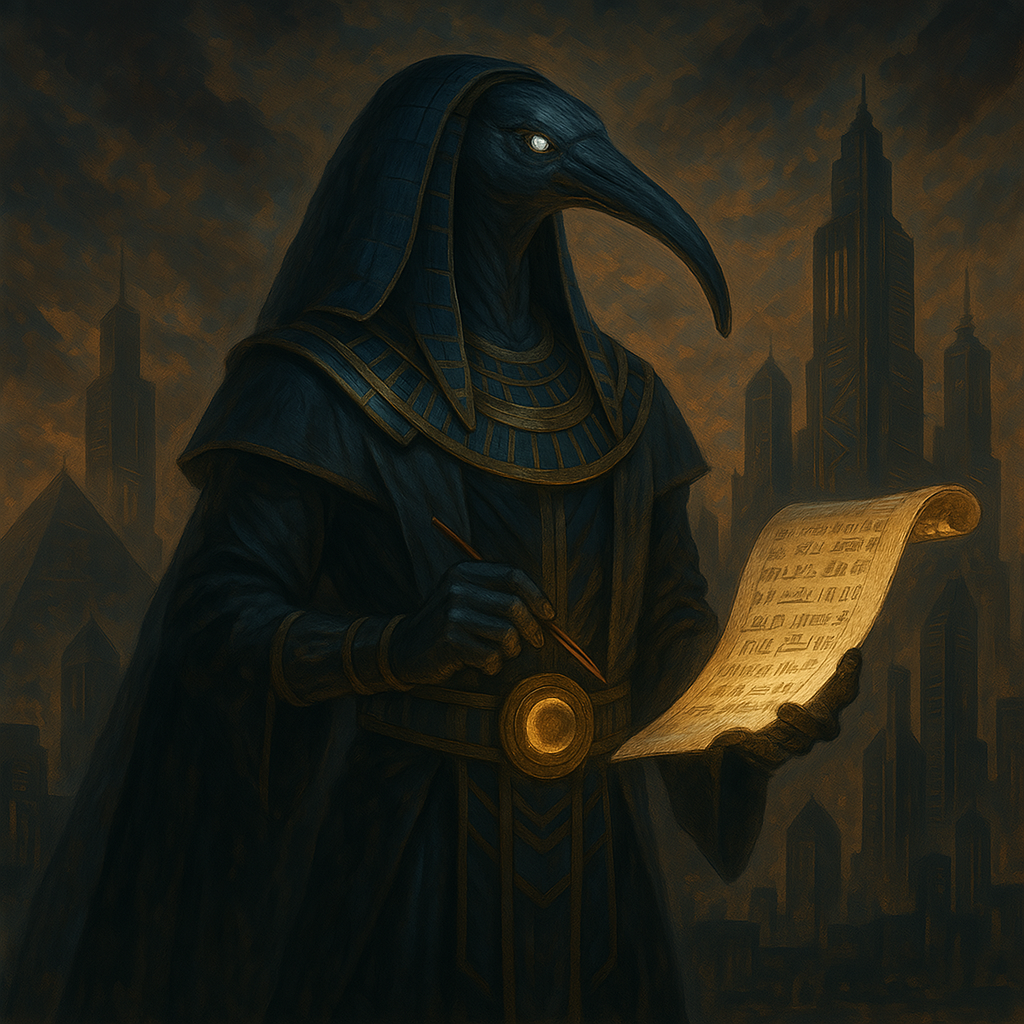Definition
Thoth (also spelled Djehuty or Tehuti) is the ancient Egyptian god of wisdom, writing, language, science, magic, and the moon. Revered as the divine scribe and keeper of sacred knowledge, Thoth served as a mediator among gods and a guardian of cosmic balance and truth. He is credited with the invention of hieroglyphic writing, the measurement of time, and the formulation of laws, rituals, and esoteric teachings.
Origins and Mythological Role
Thoth was worshipped from the earliest dynastic periods and remained a central figure throughout Egyptian history. Highly respected among both priests and scholars, he was seen as a universal intelligence—the mind behind divine order, language, and creation itself.
Attributes and Associations
- Wisdom & Knowledge: Patron of learning, scholars, and scribes.
- Writing & Language: Inventor of hieroglyphs and all written communication.
- Time & Calendars: Keeper of lunar and solar time cycles, credited with creating the 365-day year.
- Magic & Alchemy: Master of divine speech, sacred geometry, and spiritual transformation.
- Balance & Justice: Associated with Ma’at, the principle of truth, balance, and cosmic harmony.
- The Moon: Linked to lunar cycles and timekeeping, complementing Ra’s solar path.
Thoth was often invoked in rituals, legal matters, magical operations, and scholarly endeavors.
Symbols and Iconography
- Ibis Head: Thoth is commonly depicted as a man with the head of an ibis—symbolizing wisdom, concentration, and divine precision.
- Baboon Form: He also appears as or accompanied by a baboon, a sacred animal associated with intelligence and lunar knowledge.
- Scribes’ Palette & Stylus: Symbolizing his role as the divine record keeper.
- Moon Disk & Crescent: Representing his connection to the moon and time cycles.
- Scrolls & Tablets: Reflecting his mastery of language, law, and metaphysical teachings.
Thoth is typically portrayed:
- Standing or seated with a writing instrument.
- Recording events, divine decrees, or the outcome of judgment scenes.
Roles and Powers
1. Inventor of Writing and Keeper of Knowledge
Thoth is credited with creating hieroglyphs, allowing sacred and historical knowledge to be preserved. He also gifted humanity with the arts of communication, arithmetic, and astronomy.
2. Divine Scribe and Record-Keeper
Thoth served as the scribe of the gods, recording major events, including the outcomes of divine judgments. He was the divine archivist, maintaining the Akashic-like records of creation.
3. God of Magic and Sacred Speech
Thoth was master of heka (magic), using sacred utterances to manifest divine will. Words spoken by Thoth were considered to create reality, demonstrating the power of divine logos (speech).
4. Mediator and Peacemaker
Thoth often acted as a mediator between gods, resolving conflicts—such as aiding in the restoration of Horus’s eye and reconciling disputes between Horus and Set.
5. Judge and Guardian of the Afterlife
In the Weighing of the Heart ceremony, Thoth recorded the results as Anubis weighed the soul’s heart against the feather of Ma’at. He ensured truth and integrity in the process of judgment.
Temples and Worship
Hermopolis (Khmunu)
- Thoth’s primary cult center was in Hermopolis Magna, known in Egyptian as Khmunu, the “City of Eight.”
- The eight deities of the Ogdoad cosmology were honored here, with Thoth presiding over this divine group of creators.
Temples and Shrines
- Thoth was also honored in other sacred cities, including Thebes and Abydos.
- He was frequently invoked in temple libraries, schools, and legal chambers.
Priests and Devotees
- Priests of Thoth were scholars, astronomers, physicians, and scribes.
- His followers were entrusted with guarding sacred texts and performing precise rituals.
Thoth in Esoteric and Hermetic Traditions
- In the Greco-Roman period, Thoth was merged with Hermes, giving rise to the composite deity Hermes Trismegistus—“Thrice-Great Hermes.”
- The Hermetic texts, influential in Western esotericism, are said to originate from this fusion of Egyptian and Hellenistic wisdom.
- Thoth is considered the father of alchemy, sacred geometry, and occult knowledge.
Spiritual Significance and Modern Interpretation
In modern metaphysical, magical, and spiritual circles, Thoth is seen as:
- The divine mind or cosmic intelligence behind creation and manifestation.
- A guide to higher knowledge, truth, and mystical initiation.
- A patron of esoteric wisdom, language, divination, and ritual mastery.
- A teacher of balance between intellect and intuition, reason and magic.
Practitioners may invoke Thoth for:
- Clarity in learning or communication
- Support in spiritual studies or writing
- Protection during magical or ritual work
- Guidance in accessing universal knowledge or sacred memory
Conclusion
Thoth is the eternal scribe, the voice of divine order, and the keeper of sacred wisdom. As a god of intellect, language, and metaphysics, he offers both the structure and inspiration behind all higher learning. In myth and modern spirituality alike, Thoth remains a timeless figure—bridging the worlds of magic and logic, seen and unseen, word and creation.

